polly7
polly7's JournalMelting Permafrost Could Cost World Economy $43 Trillion by 2100: Study
Published on
Monday, September 21, 2015
byCommon Dreams
Doing nothing to slow the fast-warming Arctic carries an enormous economic price tag, warns new research
byJon Queally, staff writer
 ?itok=3aGfoIaB
?itok=3aGfoIaB
Permafrost on the northeastern side of Spitsbergen, Svalbard, an island in the arctic region between Norway and the North Pole. (Photo: Olafur Ingolfsson)
In a paper published in the journal Nature Climate Change, Prof. Chris Hope of Cambridge University and Prof. Kevin Schaefer, from the National Snow and Ice Data Center at the University of Colorado, say their study shows that because the "Arctic is warming roughly twice as fast as the global average" and if current trends continue, the melting of huge sections of permafrost in the coming decades could result in hundreds of billions of ton of carbon dioxide (CO2) and billions of tons of methane (CH4) being released into the atmosphere.
Such an enormous increase of greenhouse gases would result in both economic and non-economic impacts, the researchers said. Computer models run by Hope and Schaefer found that melting permafrost would lead to higher chances of catastrophic and cascading events, such as the melting of the Greenland and West Antarctic ice sheets which would lead to increased flooding and more extreme weather around the world. Economic impacts cited included direct influence on the gross domestic product (GDP) of countries—such as the loss of agricultural output and the additional cost of coping with floods and heatwaves—while non-economic impacts included negative effects on human health and natural ecosystems.
Full article: http://www.commondreams.org/news/2015/09/21/melting-permafrost-could-cost-world-economy-43-trillion-2100-study
Amid Runaway Warming, Richest Nations Spend $200 Billion Backing Fossil Fuels
Published on
Monday, September 21, 2015
byCommon Dreams
'The time is ripe for countries to demonstrate they are serious about combating climate change'
byLauren McCauley, staff writer

The OECD Inventory identified 800 separate spending programs and tax breaks used by governments in the 40 industrial or emerging economies that encourage oil, gas, and coal development. (Photo: Robert S. Donovan/cc/flickr)
"We’re totally schizophrenic," said Angel Gurría, secretary-general of the Paris-based organization. "We’re trying to reduce emissions, and we subsidize the consumption of fossil fuels. These policies are not obsolete, they’re dangerous legacies of a bygone era when pollution was viewed as a tolerable side effect of economic growth. They should be erased from the books."
Further, Gurría pointed out that governments "are spending almost twice as much money supporting fossil fuels as is needed to meet the climate-finance objectives set by the international community, which call for mobilizing $100 billion a year by 2020."
The OECD Inventory identified 800 separate spending programs and tax breaks used by the governments of its 34 member countries, plus six key emerging economies—Brazil, China, India, Indonesia, Russia and South Africa—that encourage oil, gas, and coal development.
Full article: http://www.commondreams.org/news/2015/09/21/amid-runaway-warming-richest-nations-spend-200-billion-backing-fossil-fuels
What the leaders need to understand about Canada’s shifting economy
JEFF RUBIN
Special to The Globe and Mail
Published Monday, Sep. 21, 2015 9:37AM EDT
Last updated Monday, Sep. 21, 2015 11:43AM EDT
Oil sands operators have already shelved billions in planned investment. Indeed, the oil sector’s rapid implosion in spending is the principle cause of the oil-inspired downturn that’s caused the much-discussed economic contraction we’ve seen so far this year. And that doesn’t even take into consideration the future of the two million barrels a day of oil sands production that currently exists. The billions spent on that output is already gone and the jobs that depend on it may follow shortly.
Whether the country’s shifting economic fortunes will end up being the deciding factor in next month’s election remains to be seen. Regardless of the outcome, however, it’s certain that the party forming the next government will end up presiding over a very different Canadian economy than the one the Harper regime spent the last decade trying to mould.
Full article: http://www.theglobeandmail.com/report-on-business/what-the-leaders-need-to-understand-about-canadas-shifting-economy/article26450995/
Burden of Mass Incarceration Falls Heavily on Families
The average family of an inmate incurs about $13,607 in debt for court-related costs, according to a report by the Ella Baker Center, Forward Together and Research Action Design, organizations that advocate for criminal justice and other social justice reforms. More than one-third of families go into debt to pay for phone calls and visits to keep in touch with a loved one behind bars, the study found.
Of the family members responsible for these costs, 83 percent were women, the report found. Many families surveyed for the study were struggling to pay for food or rent.
“This study confirms what society has ignored for too long — that already vulnerable families and the women who sustain them are being plummeted into greater poverty, stress, and strain when their loved ones are incarcerated,” said Alicia Walters, a lead activist at Forward Together, an organization that helped conduct the study.
Full article: https://zcomm.org/znetarticle/burden-of-mass-incarceration-falls-heavily-on-families/
Ten Reasons to Oppose the Saudi Monarchy
4. Saudi women are second-class citizens. The religious police enforce a policy of gender segregation and often harass women, using physical punishment to enforce a strict dress code. Women need the approval of a male guardian to marry, travel, enroll in a university, or obtain a passport and they’re prohibited from driving. According to interpretations of Sharia law, daughters generally receive half the inheritance awarded to their brothers, and the testimony of one man is equal to that of two women.
8. The Saudis are funding terrorism worldwide. A Wikileaks-revealed 2009 cable quotes then-Secretary of State Hillary Clinton saying “Donors in Saudi Arabia constitute the most significant source of funding to Sunni terrorist groups worldwide….More needs to be done since Saudi Arabia remains a critical financial support base for al-Qaeda, the Taliban, Lashkar e-Tayyiba and other terrorist groups.” In Syria the Saudis are supporting the most extreme sectarian forces and the thousands of volunteers who rally to their call. And while the Saudi government condemns ISIS, many experts, including 9/11 Commission Report lead author Bob Graham, believe that ISIL is a product of Saudi ideals, Saudi money and Saudi organizational support.
9. The Saudis have used their massive military apparatus to invade neighboring countries and quash democratic uprisings. In 2011, the Saudi military (using US tanks) rolled into neighboring Bahrain and brutally crushed that nation’s budding pro-democracy movement. In 2015, the Saudis intervened in an internal conflict in Yemen, with a horrific bombing campaign (using American-made cluster munitions and F-15 fighter jets) that has killed and injured thousands of civilians. The conflict has created a severe humanitarian crisis affecting 80 percent of the Yemeni people.
https://zcomm.org/znetarticle/ten-reasons-to-oppose-the-saudi-monarchy/
After granting foreign workers several months to regularize their status, the government launched a crackdown on irregular foreign migrants in November 2013, arresting, detaining and deporting hundreds of thousands of foreign workers in order to open more jobs to Saudi Arabians. In March, the Interior Minister stated that the authorities had deported over 370,000 foreign migrants in the preceding five months and that 18,000 others were in detention. Thousands of workers were summarily returned to Somalia and other states where they were at risk of human rights abuses, with large numbers also returned to Yemen. Many migrants reported that prior to their deportation they had been packed into severely overcrowded makeshift detention facilities where they received little food and water and were abused by guards.
Cruel, inhuman or degrading punishment
The courts continued to impose sentences of flogging as punishment for many offences. Blogger Raif Badawi was sentenced to a flogging of 1,000 lashes in addition to a prison sentence. Human rights defender Mikhlif bin Daham al-Shammari was sentenced to 200 lashes as well as a prison term.
In September, the authorities released Ruth Cosrojas, a Filipino domestic worker sentenced to 18 months’ imprisonment and 300 lashes after an unfair trial in October 2013 where she was convicted of organizing the sale of sex (quwada). She had received 150 lashes by the time of her release.
Death penalty
Courts continued to impose death sentences for a range of crimes, including some that did not involve violence, such as “sorcery”, adultery and drug offences, frequently after unfair trials. Some defendants, including foreign nationals facing murder charges, alleged that they had been tortured or otherwise coerced or misled into making false confessions in pre-trial detention.
The authorities carried out dozens of executions, many by public beheading. Those executed included both Saudi nationals and foreign migrants.
https://www.amnesty.org/en/countries/middle-east-and-north-africa/saudi-arabia/report-saudi-arabia/
bbm
Back to the horrors in Yemen, which is being destroyed ....... by Saudi Arabia.
Kill Chain: The Rise of the High-Tech Assassins, by Andrew Cockburn
Review by Ed O’Loughlin: Are drones the new wonder weapons, or an expensive and dangerous waste of time?[URL=
 .html][IMG]
.html][IMG]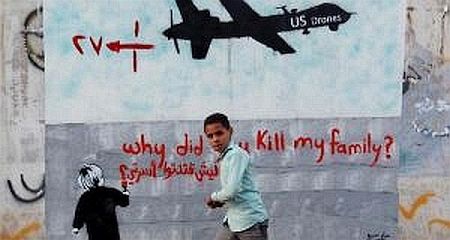 [/IMG][/URL]
[/IMG][/URL]
First, is assassination a useful policy? Second, does drone technology, along with its multibillion-dollar suites of surveillance and processing add-ons, and its growing thousands of support personnel, do what it says on the tin?
The ultimate trigger for the attack – which claimed 23 innocent lives, including those of two children under four – came when the travellers got out of their vehicles at dawn to pray. According to the Americans’ sketchy training, this proved that they were terrorists about to attack.
Compounding this inbuilt cultural ignorance are grave technological failings. The drones’ vaunted intelligence, surveillance and reconnaissance cameras – the “unblinking eye” of the American war effort – turn out to be so low in resolution and so narrow in focus that they are seldom able to tell people from bushes, let alone terrorists from civilians.
Sceptics compare it to watching Google Earth through a soda straw. Yet the delusion of God-like knowledge has captivated senior military and political figures in the US, allowing them to participate in operations from the comfort of their offices.
Full review: http://www.irishtimes.com/culture/books/kill-chain-the-rise-of-the-high-tech-assassins-by-andrew-cockburn-1.2324249
Not The Nukes: What Israel Fears Most About An Economically Robust Iran
Mnar Muhawesh speaks with geopolitical analyst Sharmine Narwani who was present in Geneva during the Iran talks about the deal as it’s written to help clear the clogged up airwaves media pundits and politicians have filled with special interest talking points not facts that have been funded by the Israeli and Saudi lobbies.By Mnar Muhawesh @mnarmuh | September 17, 2015
Unlike our politicians, she actually read all 160 pages of the deal, line by painstakingly negotiated line.
And she explains that all this fear mongering is just a red herring to prevent any boost to Iran’s economy because, you see, what the media won’t tell you is that Iran is on its way to becoming an economic and manufacturing superpower in the Middle East, which threatens none other than Israel and Saudi Arabia’s bought influence on U.S. politics and foreign relations.
http://www.mintpressnews.com/not-the-nukes-what-israel-fears-most-about-an-economically-robust-iran/209630/
Migrant Crisis & Syria War Fueled By Competing Gas Pipelines
Don’t let anyone fool you: Sectarian strife in Syria has been engineered to provide cover for a war for access to oil and gas, and the power and money that come along with it.By Mnar Muhawesh @mnarmuh | September 9, 2015
Editor’s note: This article has been updated to reflect recent Wikileaks revelations of US State Department leaks that show plans to destabilize Syria and overthrow the Syrian government as early as 2006. The leaks reveal that these plans were given to the US directly from the Israeli government and would be formalized through instigating civil strife and sectarianism through partnership with nations like Saudi Arabia, Turkey, Qatar and even Egypt to break down the power structue in Syria to essentially to weaken Iran and Hezbolla. The leaks also reveal Israeli plans to use this crisis to expand it’s occupation of the Golan Heights for additional oil exploration and military expansion.
Indeed, it’s worth asking: How did demonstrations held by “hundreds” of protesters demanding economic change in Syria four years ago devolve into a deadly sectarian civil war, fanning the flames of extremism haunting the world today and creating the world’s second largest refugee crisis?
Foreign meddling in Syria began several years before the Syrian revolt erupted. Wikieaks released leaked US State Department cables from 2006 revealing US plans to overthrow the Syrian government through instigating civil strife, and receiving these very orders straight from Tel Aviv. The leaks reveal the United State’s partnership with nations like Saudi Arabia, Turkey, Qatar and even Egypt to use sectarianism to divide Syria through the Sunni and Shiite divide to destabilize the nation to weaken Iran and Hezbolla. Israel is also revealed to attempt to use this crisis to expand it’s occupation of the Golan Heights for additional oil exploration.
According to major media outlets like the BBC and the Associated Press, the demonstrations that supposedly swept Syria were comprised of only hundreds of people, but additional Wikileaks cables reveal CIA involvement on the ground in Syria to instigate these very demonstrations as early as March 2011.
Perhaps the most accurate description of the current crisis over gas, oil and pipelines that is raging in Syria has been described by Dmitry Minin, writing for the Strategic Cultural Foundation in May 2013: ..........
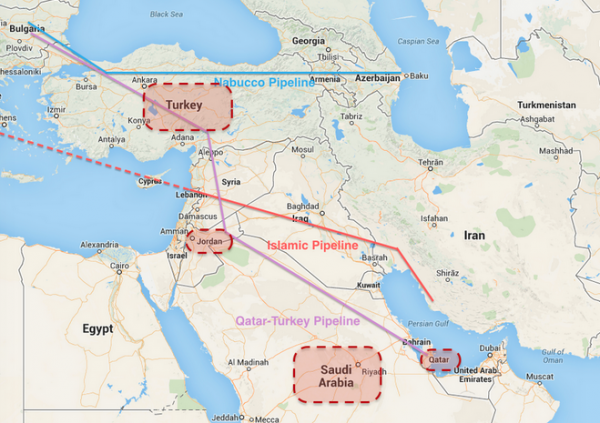
Note the purple line which traces the proposed Qatar-Turkey natural gas pipeline and note that all of the countries highlighted in red are part of a new coalition hastily put together after Turkey finally (in exchange for NATO’s acquiescence on Erdogan’s politically-motivated war with the PKK) agreed to allow the US to fly combat missions against ISIS targets from Incirlik. Now note which country along the purple line is not highlighted in red. That’s because Bashar al-Assad didn’t support the pipeline and now we’re seeing what happens when you’re a Mid-East strongman and you decide not to support something the US and Saudi Arabia want to get done. (Map: ZeroHedge.com)
Divide and conquer: A path to regime change: ( ........... read more.)
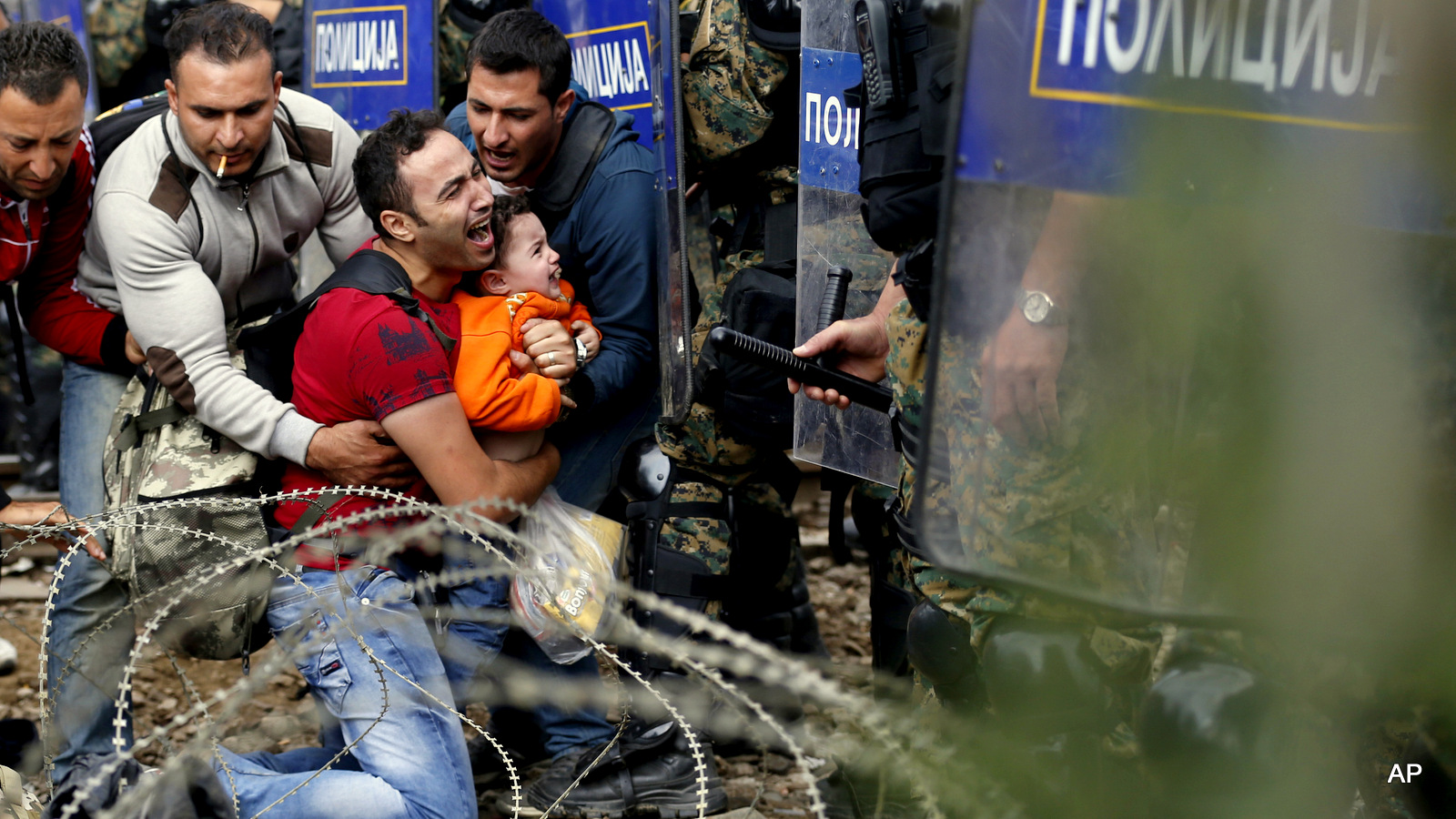
Refugee’s assist a fellow Refugee holding a boy as they are stuck between Macedonian riot police officers and refugees during a clash near the border train station of Idomeni, northern Greece, as they wait to be allowed by the Macedonian police to cross the border from Greece to Macedonia, Friday, Aug. 21, 2015. Macedonian special police forces have fired stun grenades to disperse thousands of refugees stuck on a no-man’s land with Greece, a day after Macedonia declared a state of emergency on its borders to deal with a massive influx of refugees heading north to Europe. (AP Photo/Darko Vojinovic)
http://www.mintpressnews.com/migrant-crisis-syria-war-fueled-by-competing-gas-pipelines/209294/
Fury After Saudi Arabia ‘Chosen To Head Key UN Human Rights Panel’
The Saudis’ bid emerged shortly after it posted a job advertisement for eight new executioners, to cope with what Amnesty International branded a “macabre spike” in the use of capital punishment, including beheadings, this year.By The Independent | September 21, 2015
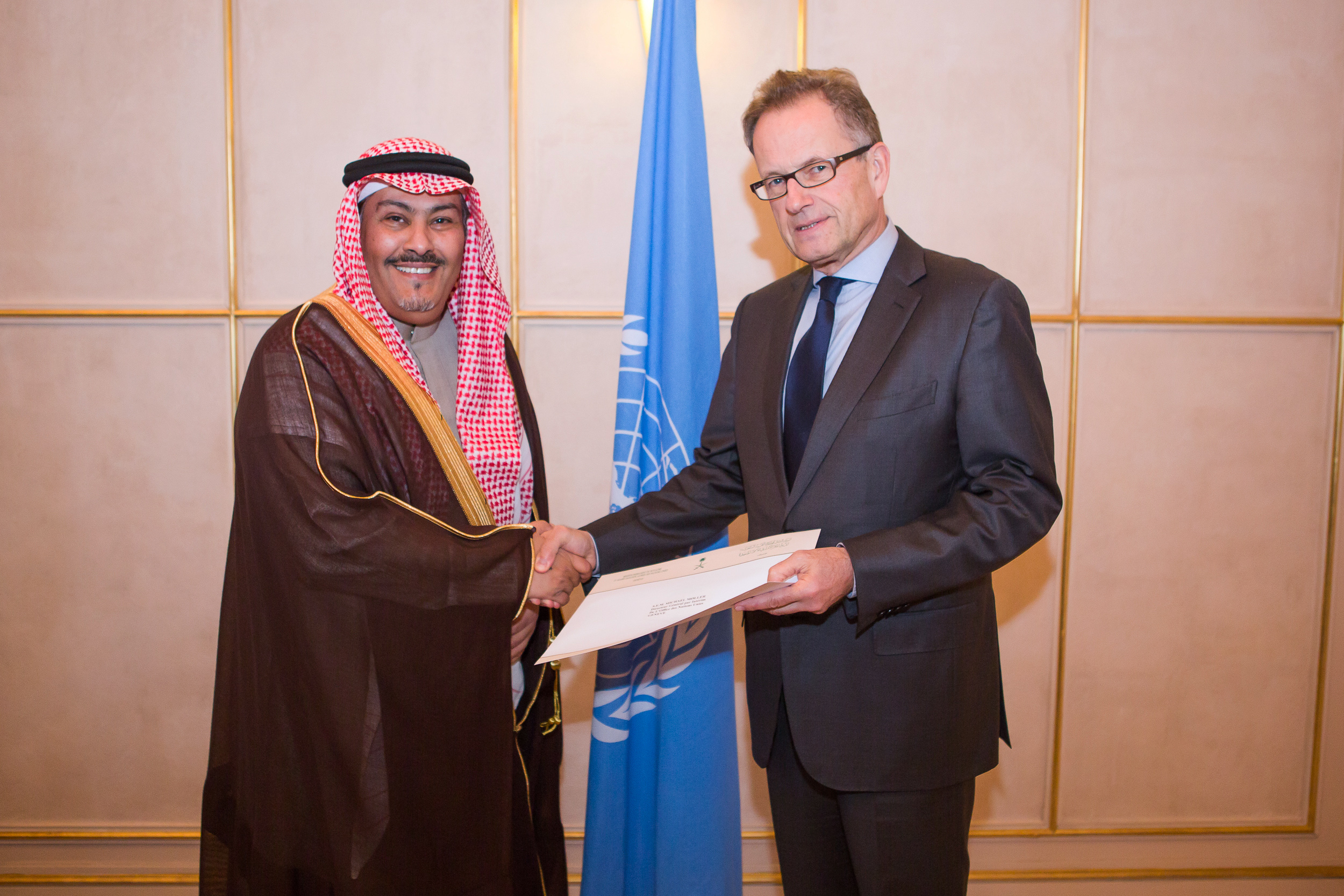
Faisal bin Hassan Trad, the Kingdom of Saudi Arabia (left), presents his credentials to the Acting Director-General of the United Nations Office, Michael Møller( right) at Geneva. January 7th, 2014. Photo by Pierre Albouy
Critics, including the wife of imprisoned pro-democracy blogger Raif Badawi – sentenced to 1,000 lashes for blogging about free speech – labelled the appointment “scandalous”, saying it meant “oil trumps human rights”.
Mr Badawi’s wife, Ensaf Haidar, who is leading an international campaign to free her husband, said on Facebook that handing the role to Faisal bin Hassan Trad, Saudi Arabia’s ambassador at the UN in Geneva, was effectively “a green light to start flogging [him] again”
http://www.mintpressnews.com/fury-after-saudi-arabia-chosen-to-head-key-un-human-rights-panel/209729/
James O'Brien grills Daniel Kawczynski MP on Saudi arms sales - Newsnight
Masterclass on how to interview a politician trying to justify war crimesBy Glenn Greenwald, The Intercept
Stop the War Coalition
Saturday, Sep 19, 2015

Journalism is most valuable when it is devoted to what is most difficult: namely, focusing on the bad acts of one’s own side.
The ongoing atrocities by Saudi Arabia and its “coalition partners” in Yemen reflect powerfully — and horribly — on both the US and UK.
Each time he’s confronted with questions about the war crimes committed by the side his own government arms and supports, Kawczynski ignores the topic and instead demands to know why the BBC isn’t focused instead on the bad acts of the Houthis, the rebel group the Saudis are fighting, which the Saudis (dubiously) claim is controlled by Iran.
Over and over, when O’Brien asks about the role the UK Government is playing in Saudi war crimes, Kawczynski tries to change the topic by demanding that the BBC instead talk about Iran and the Houthis: “You have an agenda at Newsnight and you don’t want anyone to dispute the way in which you are covering this war. You have an agenda against the Gulf States coalition. … Why haven’t you shown any coverage of the massacres … by the Houthi tribes?”
This superb interview by this BBC host is an excellent illustration of the virtues of adversarial journalism. Even more significantly, it demonstrates why journalism is most valuable when it is devoted to what is most difficult: namely, focusing on the bad acts of one’s own side, holding accountable those who wield power in one’s own country and those of its closest allies, challenging the orthodoxies most cherished and venerated by one’s own society.
The British MP who was interviewed by Newsnight, Daniel Kawczynski, is now threatening to sue the BBC and its producer, Ian Katz, over the interview. He’s particularly upset that after the interview, Katz posted the documents showing that Kawczynski received a “donation” from the Saudi Foreign Ministry to visit. As is so often the case, the most vocal tough-guy-warriors are such delicate flowers.
http://axisoflogic.com/artman/publish/Article_71627.shtml
Pathetic.
Humanitarian Crisis in War-Battered Yemen
http://www.democraticunderground.com/1016122828
Yemen's Heritage, a Victim of War
http://www.democraticunderground.com/1016124756
Saudi-led forces accused of cluster bombings in Yemen
http://www.aljazeera.com/news/2015/08/cluster-bombs-yemen-150827155039946.html
Despite Global Ban, Saudi-Led Forces Kill Dozens in Yemen Using U.S.-Made Cluster Bombs
KENNETH ROTH: They’re devastating. They’re like standing on a land mine. They, at minimum, will rip off your limbs, and they very frequently are completely lethal.
AMY GOODMAN: I want to turn to a video released by Human Rights Watch featuring interviews with victims of cluster munitions in Yemen.
AZIZ HADI MATIR HAYASH: [translated] We were together, and a rocket hit us. It exploded in the air, and cluster bombs, submunitions, fell out of it. Before we left the house with the sheep, two submunitions fell down while others spread all over the village. One exploded, and the other still remains. My cousins and I were wounded.
FATIMA IBRAHIM AL-MARZUQI: [translated] Three brothers were killed—two children and one adult. It hit us while we were sleeping, and we were all wounded, including my brothers. I can’t walk. My mother carries me. She gets me out, washes me, as well as my brother. My whole body is wounded. My dress was burned that night. My hands were burned, and my bones were broken.
http://www.democracynow.org/2015/9/1/despite_global_ban_saudi_led_forces
Yemen: U.N. Condemns U.S.-Backed Airstrikes on Port City of Hudaydah
In news from Yemen, the United Nations has condemned the U.S.-backed, Saudi-led airstrikes on the port city of Hudaydah. U.N. aid chief Stephen O’Brien called the strikes a violation of international law and warned they would worsen the humanitarian crisis. The port city has been a key area in the delivery of humanitarian aid, although the Saudi-led blockade has slowed the delivery of food and medical supplies. O’Brien spoke Wednesday.
Stephen O’Brien: "I was shocked by what I saw. The civilian population is bearing the brunt of the conflict. A shocking four out of five Yemenis require humanitarian assistance, and nearly 1.5 million people are internally displaced. More than 1,000 children have been killed or injured, and the number of young people recruited or used as fighters is increasing."
http://www.democracynow.org/2015/8/20/headlines#8206
The Human Carnage of Saudi Arabia’s War in Yemen
27 August 2015, 17:57 UTC
Bombs dropped by the Saudi-led air campaign have all too often landed on civilians, contributing to this humanitarian disaster. In the ruins of the Musaab bin Omar school, the meager possessions of the families who were sheltering there included a few children’s clothes, blankets, and cooking pots. I found no sign of any military activity that could have made the site a military target. But I did see the remains of the weapon used in the attack — a fin from a U.S.-designed MK80 general-purpose bomb, similar to those found at many other locations of coalition strikes.
This was far from the only instance where U.S. weapons killed Yemeni civilians. In the nearby village of Waht, another coalition airstrike killed 11 worshipers in a mosque two days earlier. There, too, bewildered survivors and families of the victims asked why they had been targeted.One of the two bombs dropped on the mosque failed to explode and was still mostly intact when I visited the site. It was a U.S.-manufactured MK82 general-purpose bomb, fitted with a fusing system also of U.S. manufacture. The 500-pound bomb was stamped “explosive bomb” and “tritonal” — the latter a designation indicating the type of explosive it contains.
https://www.amnesty.org/en/latest/news/2015/08/the-human-carnage-of-saudi-arabias-war-in-yemen/
‘Stronger than Al-Qaeda’: ISIL poised to rise in southern Yemeni city
Analysis: In midst of security vacuum, Aden could see surge of activity by Islamic State fighters and supporters
September 17, 2015 5:00AM ET
by Iona Craig
http://america.aljazeera.com/articles/2015/9/17/embattled-yemen-aden-rise-islamic-state.html
What’s Really Driving The Saudi-Led Attacks On Yemen?
Oil.
By Catherine Shakdam | April 2, 2015
“Al Sauds have always viewed Yemen as a threat to their hegemony, both militarily and geostrategically. Ibn Saud actually told his sons that for Al Saud to survive in the region, Yemen would have to be tamed,” Nahshal said. “This war is about restoring control over a Saudi colony, this war is about putting Yemen’s freedom under lock and key.”
“Everything else, all these talks of sectarianism and democracy, legitimacy and national security, are shiny lies thrown out at the public to hide the truth.”
Indeed, nothing is ever really as it seems in Yemen. The country is a complicated maze of intermixing political interests, sectarian ambitions and geostrategic realities, where world powers are engaging in a bitter fight for control over oil access and resources.
“The new battleground of this Great Game world powers never stopped [playing], Yemen has become the region’s new frontline. What we see unfold in Yemen is the new oil rush, a bitter battle for control over the world oil route Bab al-Mandab. The fact that a nation finds itself caught in the middle of such ambitions is of no consequence to Al Saud,” Ahmed Mohamed Nasser Ahmed, a Yemeni political analyst and former member of Yemen’s National Issues and Transitional Justice Working Group at the National Dialogue Conference, told MintPress.
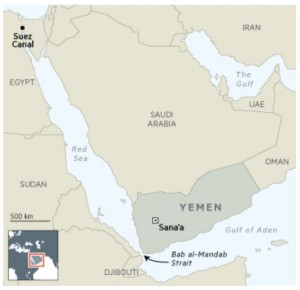
Bab al-Mandab is one of the seven “choke points” in the worldwide delivery of oil. The Bab al-Mandab strait separates the Arabian Peninsula from East Africa and links the Red Sea with the Gulf of Aden and the Indian Ocean. Most ships using the waterway have come from, or are going to, Egypt’s Suez Canal, which connects the Red Sea with the Mediterranean. This contributes about $5 billion a year to the Egyptian economy and gives the country a large degree of control over the world’s major oil route.
Full article: http://www.mintpressnews.com/whats-really-driving-the-saudi-led-attacks-on-yemen/203879/
Time for UN to Shift Mission in Yemen
by Nicola Nasser / September 28th, 2015
The Saudi insistence on dictating a fait accompli on Yemen is undermining the UN efforts to bring about a political solution, which was made impossible by the Saudi – led war on Yemen.
Long before there was an “Iran threat” or a “Shiite threat,” the Saudi ruling family never hesitated to interfere in Yemen militarily or otherwise whenever Yemenis showed signs of breaking away from Saudi hegemony towards a free will to determine their lives independently.
In the 1930s the Saudis engaged in a war on the Mutawakkilite Imamate of Yemen and succeeded in annexing the Yemeni provinces of Asir, Jizan and Najran to their kingdom, thus creating a border dispute that was not settled until 2000, but the current Saudi war on Yemen seems to reignite it.
Full article: http://dissidentvoice.org/2015/09/time-for-un-to-shift-mission-in-yemen/
Yemen’s forgotten war (PART ONE) - BBC Newsnight
&annotation_id=49afb2ea-5d43-4451-975b-8d8b7a1dbe74&src_vid=Gi5z4M5dm4o&feature=cards
Profile Information
Gender: Do not displayHometown: Saskatchewan
Home country: Canada
Member since: Sat Jul 9, 2005, 11:46 PM
Number of posts: 20,582